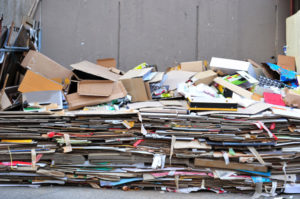
Even with all of the rain and snow of late, spring is around the corner. As we march forward, thoughts of cleaning out our house and getting rid of clutter are probably top of mind.
It’s quite easy to accumulate clutter especially when it comes to paper. As our lives and finances get more complicated, we seem to gather more and more paper.
Let’s look at what papers to keep, the length of time to keep them and how we should destroy them.
Tax Returns
The IRS can audit your past tax returns for three years or longer if they have a reason to suspect fraud.
Save all of the paperwork with your tax returns for three years. This would include W-2s, 1099s for interest and dividends, and pension distribution 1099-Rs. Also, keep the documentation for capital gains or losses. Proof of payments made to the IRS and your state tax authority should also be maintained. After the three years, keep the tax returns themselves without the documentation for an additional four years.
If you are really concerned about an audit, store the supporting documentation for the entire seven years as well.
On tax returns that included items such as a tax-deferred 1031 exchange, capital losses, or any other long-term transactions, keep the tax returns until those transactions have been finished. Save them with the three to seven years guidelines above.
Documents to Keep Forever
We can accumulate many documents that we rarely use but are still important to hold on to indefinitely.
Examples of these documents include:
- wills, trusts and other estate planning documents
- birth and death certificates
- baptismal certificates
- marriage certificates
- divorce agreements
- passports
- Social Security cards
- military records
- adoption certificates
- education records and diplomas
- any other documents that might have historical significance
The original documents should be stored in a secure place such as a safe or a safety deposit box at a bank. Keep digital copies of them in a password protected cloud, with an extra copy on your computer or on a hard drive.
While you don’t use them often, it’s important to be able to access them when you need them.
Short-Term Documents
Some documents such as utility bills, credit card receipts, and deposit and withdrawal receipts only need to be kept until you get your next statement.
Once you have confirmed that the utility payments were recorded correctly, you can destroy the prior month’s bills. Use the credit card receipts to confirm what is on your bill and then destroy them. If you disagree with a charge, hold onto the credit card receipt until the dispute is settled.
Long-Term Documents
Bank statements should be kept for at least one year especially if they are a back-up for tax items. Brokerage statements should be preserved for a longer period of time if there is a possibility that you will need to refer to them to find out stock basis at the time of purchase or stock exchanges or other unusual transactions.
Items such as purchase and lease agreements should be retained until the item is sold or the contract is completed. Documentation for major upgrades to your house should also be kept until the house is sold. If you own vehicles, keep the titles until you have sold them.
Life insurance policies, pension plan and IRA information should be saved until they have been replaced or no longer exist.
Keeping Your Documents Safe
Important documents should be kept in a safe or safety deposit box to keep them protected. If you have other paper documents you are storing, designate one safe place in your home for them, and keep them organized so you can find them in a short period of time. Locking them up in a desk or filing cabinet is a good idea.
If you are maintaining the documents in digital files, make sure they are password protected and you have multiple copies in different areas in case a computer crashes or other issues come up.
Protecting Your Identity
Identity theft is happening everywhere. Be careful when you dispose of the papers you don’t need to retain. Shred any paper with your personal information especially your Social Security number or any other personal identification numbers.
For your digital documents, bank statements, and brokerage statements make sure that they are password protected and change the password regularly.
Following the above strategies will help you get rid of paper clutter, organize the important papers in your life and give you access to essential documents quickly.
By MARCIA CAMPBELL | Contributing columnist with THE PRESS ENTERPRISE
PUBLISHED: March 3, 2019
Marcia L. Campbell has worked as a CPA for over 25 years specializing in seniors, trusts, estates, court accountings, and probate litigation support. You can reach her at Marcia@MCampbellCPA.com


